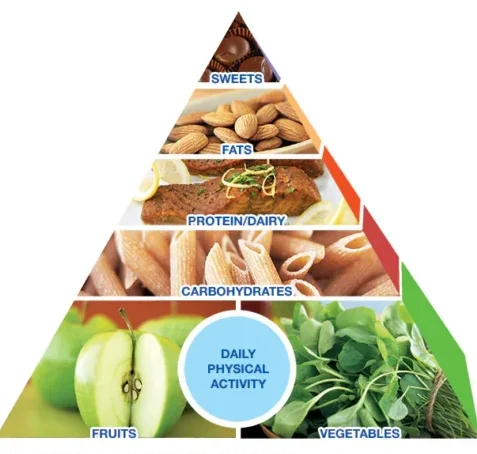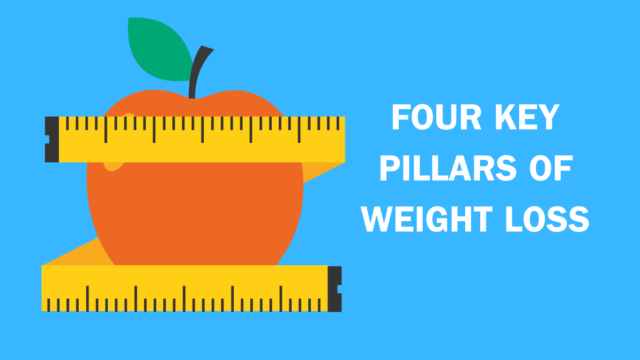Weight loss is not just about shedding pounds but it is also about adopting a healthier lifestyle and you need to understand this. Four key pillars of weight loss are proper nutrition, adequate sleep, healthy levels of exercise, and emotional health care.

Four Key Pillars of Weight Loss
1. Proper Nutrition: The Foundation of Weight Loss
Proper nutrition is the cornerstone of effective weight loss. It’s not about fad diets or deprivation but rather making smart choices to nourish your body. A balanced diet provides the essential nutrients your body needs to function optimally while managing calorie intake to achieve a caloric deficit.
- Whole Foods: The basis of proper nutrition is consuming whole, unprocessed foods. These are foods in their natural state, such as fruits, vegetables, whole grains, lean proteins, and healthy fats. Whole foods are packed with nutrients, fiber, and antioxidants that promote overall health and satiety.
- Calorie Control: Weight loss ultimately boils down to consuming fewer calories than you burn. This creates a calorie deficit, forcing your body to utilize stored fat for energy. However, it’s essential to maintain a balance between reducing calorie intake and meeting your nutritional needs to prevent malnutrition.
- Portion Control: Monitoring portion sizes helps prevent overeating. Mindful eating, which involves savoring your food and paying attention to hunger and fullness cues, can also be instrumental in portion control.
2. Adequate Sleep: The Silent Weight Loss Weapon
Sleep often goes unnoticed in the weight loss equation, but it’s a crucial factor. Inadequate sleep can disrupt hormonal balance and lead to weight gain. Here’s how it works:
- Hormone Regulation: Sleep plays a pivotal role in regulating hormones that control appetite and metabolism. Sleep deprivation can disrupt the balance of hormones like ghrelin (which stimulates appetite) and leptin (which signals fullness), leading to increased hunger and overeating.
- Decision-Making: Lack of sleep impairs decision-making, making it harder to resist unhealthy snacks and make rational food choices. The sleep-deprived brain craves high-calorie, sugary foods as a quick energy fix.
- Rest and Recovery: Sleep is also a time for physical and mental recovery. Adequate sleep ensures your body can recuperate, making it more responsive to exercise and everyday activities.
To support your weight loss journey, aim for 7-9 hours of quality sleep each night, establish a consistent sleep schedule, and create a conducive sleep environment.
3. Healthy Levels of Exercise: Energizing Your Metabolism
Exercise is a potent tool for weight loss. It not only burns calories but also enhances your metabolic rate, promotes muscle development, and boosts overall well-being.
- Aerobic Exercise: Activities like walking, running, swimming, or cycling elevate your heart rate and calorie expenditure. Aim for at least 150 minutes of moderate-intensity aerobic exercise or 75 minutes of vigorous-intensity aerobic exercise per week. Cardio workouts enhance cardiovascular health and help create a calorie deficit.
- Strength Training: Building lean muscle mass through strength training exercises is equally crucial. Muscles burn more calories at rest, contributing to a higher resting metabolic rate. Plus, they improve your physical strength and help you maintain muscle mass while losing fat.
- Balance and Consistency: Balance is key to any exercise routine. It’s important to find a workout regimen that you enjoy and can stick with. Consistency is more important than intensity. Find a balance between aerobic and strength training exercises, and gradually increase the intensity as your fitness improves.
4. Emotional Health Care: The Mind-Body Connection
Emotional well-being plays a substantial role in weight management. Emotional stress, anxiety, and depression can trigger overeating and lead to the consumption of comfort foods. Here’s how to take care of your emotional health:
- Stress Management: Chronic stress can elevate cortisol levels, which can lead to fat retention, particularly in the abdominal area. Stress management techniques like mindfulness, meditation, deep breathing, or yoga can help you cope with stress and reduce emotional eating.
- Emotional Resilience: Building emotional resilience enables you to withstand emotional triggers without turning to food for comfort. Seeking support through therapy or counseling can be beneficial in developing emotional resilience.
- Mindful Eating: Mindful eating involves being fully present while you eat, paying attention to your food’s taste and texture, and recognizing hunger and fullness cues. It fosters a healthy relationship with food and prevents emotional overeating.

By giving values to the four pillar proper nutrition, adequate sleep, healthy exercise levels, and emotional health care in weight loss journey and adopting this lifestyle you can be healthy for long term. Be comfortable with this lifestyle and you can achieve your weight loss with healthy life.

